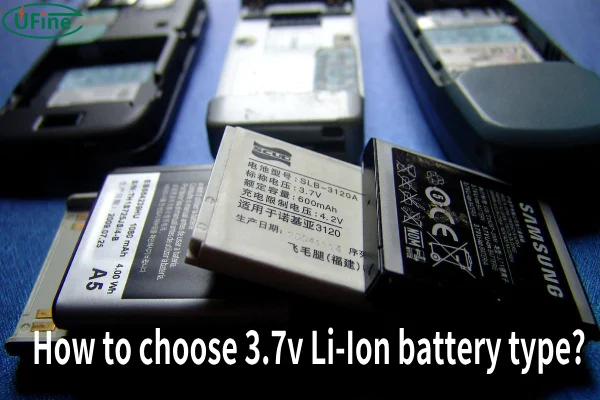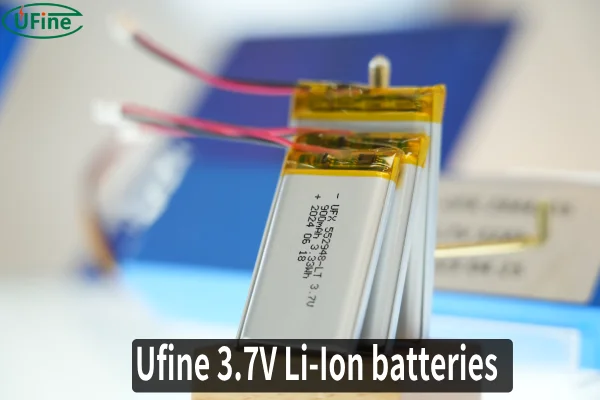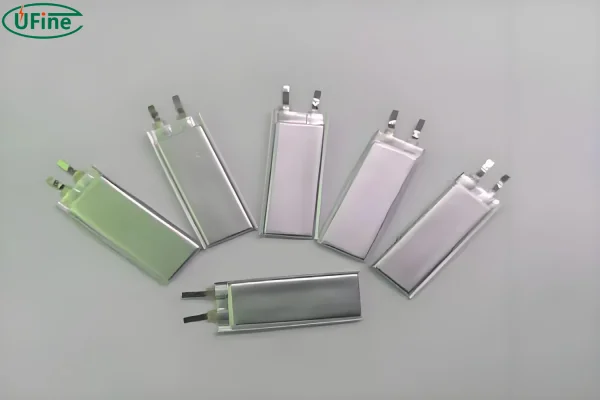
This comprehensive guide will delve into the specifics of 3.7V Li-Ion batteries, examining the types available, comparing their features, and providing guidance on selecting the right one for your needs.
Part 1. What are 3.7V Li-Ion batteries?
Lithium-ion battery (Li-ion battery for short) is a rechargeable battery. It mainly relies on the movement of lithium ions between the positive and negative electrodes of the battery to store and release energy.
The working principle of lithium-ion batteries is based on the movement of lithium ions between the positive electrode (usually lithium metal oxide) and the negative electrode (usually graphite or other types of carbon materials) through the electrolyte. During charging, lithium ions move from the positive electrode to the negative electrode, and during discharging, lithium ions move from the negative electrode back to the positive electrode.
Why 3.7V?
The choice of 3.7V is not arbitrary. It arises from the chemistry of the lithium-ion cell, which typically operates within a voltage range of 3.0V to 4.2V. The nominal voltage of 3.7V is a balance that optimizes energy use, safety, and lifespan. This makes 3.7V Li-Ion batteries ideal for a wide range of portable electronic devices where efficiency and reliability are paramount.
Part 2. Types of 3.7V Li-Ion batteries
Understanding the different types of 3.7v Li-Ion batteries is essential for selecting the right one for your specific application. Each type has unique characteristics, advantages, and disadvantages.
1. 3.7v Lithium Cobalt Oxide (LiCoO2)
-
Characteristics: LiCoO2 batteries are known for their high energy density and are widely used in consumer electronics.
-
Advantages: Their compact size and long-lasting power make them ideal for smartphones and laptops.
-
Disadvantages: However, they can overheat easily and tend to have a shorter lifespan, especially under high load conditions.
2. 3.7v Lithium Manganese Oxide (LiMn2O4)
-
Characteristics: These batteries are appreciated for their good thermal stability and safety features.
-
Advantages: LiMn2O4 batteries are safer and have a moderate energy density, suitable for high-drain applications like power tools and medical devices.
-
Disadvantages: They have a shorter lifespan compared to other types and offer less energy density than LiCoO2.
3. 3.7v Lithium Iron Phosphate (LiFePO4)
-
Characteristics: Renowned for their excellent safety profile and stability.
-
Advantages: They have a long lifespan and are very stable, making them ideal for applications requiring high reliability like solar energy storage.
-
Disadvantages: Their energy density is lower, and they tend to be larger, which might not suit all devices, especially those requiring compact sizes.
4. 3.7v Lithium Nickel Manganese Cobalt Oxide (NMC)
-
Characteristics: NMC batteries offer a balanced performance, combining the benefits of different chemistries.
-
Advantages: They are versatile with a good lifespan, making them popular in electric vehicles and power tools.
-
Disadvantages: Their energy density is moderate, and they can be more expensive than simpler chemistries.
5. 3.7v Lithium Nickel Cobalt Aluminum Oxide (NCA)
-
Characteristics: NCA batteries provide high energy output and are often used in high-performance applications.
-
Advantages: They offer a long lifespan and high capacity, suitable for electric vehicles.
-
Disadvantages: They are more costly and less safe than some other types, requiring careful management to avoid overheating and damage.
Part 3. 3.7V Li-Ion battery types comparison

To help you choose the right battery, let’s compare these types based on several critical factors. Understanding these differences is key to making an informed decision.
1. Energy Density
-
LiCoO2 batteries have the highest energy density, making them ideal for compact devices where space is limited.
-
LiFePO4 batteries offer the lowest energy density, focusing more on safety and long-term durability.
2. Safety
-
LiFePO4 batteries excel in safety due to their stable chemical structure, making them less prone to overheating and thermal runaway.
-
LiCoO2 batteries are less safe and require more careful handling to prevent overheating.
3. Lifespan
-
LiFePO4 and NCA batteries provide long lifespans, reducing the need for frequent replacements and ensuring long-term reliability.
-
LiCoO2 batteries generally have a shorter lifespan, particularly under continuous heavy use.
4. Cost
-
NCA batteries are the most expensive due to their high-performance capabilities.
-
LiCoO2 batteries are more affordable, making them suitable for applications where budget constraints are a concern.
5. Size
-
LiFePO4 batteries are larger, which might limit their use in space-constrained devices.
-
LiCoO2 batteries are compact and fit easily into small electronic devices.
6. Thermal Stability
-
LiMn2O4 batteries offer excellent thermal stability, reducing risks associated with overheating and making them reliable for high-drain applications.
-
NCA batteries require careful thermal management to prevent overheating.
7. Versatility
-
NMC batteries are highly versatile, suitable for a wide range of applications from electric vehicles to medical devices.
-
LiCoO2 batteries are more specialized, primarily used in consumer electronics where compact size is essential.
Part 4. How to choose?
Selecting the right 3.7V Li-Ion battery involves considering several factors. Here’s a detailed guide to help you make the best choice:
1. Device Requirements
-
Energy Needs: Assess the power requirements of your device. For high-drain devices like power tools, LiMn2O4 or NMC might be the best fit.
-
Size Constraints: If your device has limited space, consider LiCoO2 batteries for their compact size.
2. Safety Concerns
-
Application Safety: For applications where safety is paramount, such as in medical devices or where failure is not an option, LiFePO4 is ideal.
3. Budget
-
Cost Efficiency: Balance your budget against performance needs. LiCoO2 batteries are budget-friendly, while NCA offers high performance at a higher cost.
4. Longevity
-
Long-Term Use: If you need a battery that will last for years, consider LiFePO4 or NCA for their extended lifecycles and reliability.
5. Environmental Conditions
-
Temperature Range: Consider the operating environment. LiMn2O4 batteries are stable in various conditions, making them suitable for outdoor or extreme environments.
6. Specific Applications
-
Special Features: If your application requires specific features like fast charging or high discharge rates, look into NMC or NCA for their advanced capabilities.
7. Manufacturer Recommendations
-
Guidance: Always consult the device manufacturer’s recommendations for compatible battery types to ensure optimal performance and safety.
Part 5. Final words
Understanding the types of 3.7V Li-Ion batteries allows you to select the best one for your needs. Whether you prioritize safety, cost, or performance, there’s a type that fits your requirements. By considering the characteristics, advantages, and disadvantages of each type, you can make an informed choice that enhances the efficiency and longevity of your devices. Choose wisely and enjoy the benefits of a well-suited battery for your applications.
Related Tags:
More Articles

What are Watts and Watt Hours in Battery?
Understand watt vs watt-hour in batteries, how to calculate battery watt hours, and what Wh means for car batteries, devices, and energy storage.
A Complete Guide to the Best Batteries for Flashlights
Compare the best batteries for flashlights, including AA, AAA, 18650, 21700, CR123A. See which battery offers the best brightness, runtime, and reliability.
How Long Do Rechargeable AA Batteries Last?
How long do rechargeable AA batteries last? Compare NiMH and lithium AA lifespan, recharge cycles, key factors, and performance vs alkaline batteries.
How Much Current Can a 9V Battery Really Supply?
Discover how many amps a 9V battery can supply, its actual current output, discharge rate, and capacity for alkaline, lithium, and rechargeable 9V batteries.
12V STD vs 12V AGM: Meaning, Differences, and Which Is Better
Understand what STD and AGM batteries mean, their key differences, and which 12V battery fits your needs best in 2026.




